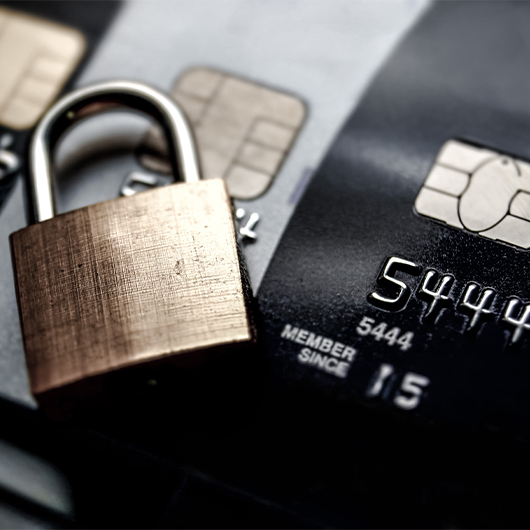Don’t Let Scammers Ruin Your Holidays
Don’t Let Scammers Ruin Your Holidays
Some of us wait all year for the hustle and bustle of the holiday season. Planning parties, buying gifts and making travel arrangements gets us in the holiday spirit as we look forward to celebrating with family and friends. Don’t get so swept up in the excitement that you become careless, though, because there’s another kind of hustle to watch out for during the holidays: cyberscams. Your finances and identity are vulnerable at this time of year, so it’s important to be diligent as you shop online, book flights and make end-of-year donations.
Here are some scams to watch out for this season as cybercriminals attempt to steal your money, information and holiday spirit.
Bogus online stores
The scam: Shopping online can be a risky endeavor if you’re not cautious. Cybercriminals reach out to unsuspecting consumers through social media, phishing (fraudulent emails) and smishing (fraudulent texts) to promote fake deals and product listings that lead to phony online stores. Once you commit to taking advantage of an incredible bargain, that fake online store takes your payment details and confirms your purchase, but never sends you the product. By the time you realize you’ve been scammed, the “owner” of the fake store may have run up your credit card balance, drained your bank account or even stolen your identity.
How to protect yourself: Don’t click on links in social media posts, emails or texts unless you’re 100% certain they’re legitimate. Be sure that any website you shop on belongs to a known, reputable company. And always remember: If a deal seems to be too good to be true, it probably is.
Holiday travel ruses
The scam: Fraudsters know that many people travel during the holidays, so this season is a great time for them to lure victims in with (nonexistent) deals on airline tickets, accommodations and vacation packages. Through phishing and smishing, scammers encourage travelers to click on links to get amazing deals or travel updates; then they steal their information.
How to protect yourself: Buy airline tickets from the airline or a third-party seller you know to be reputable. If you receive a notice of travel updates, contact the airline directly to confirm that the message is legitimate.
Missed delivery notifications
The scam: As if porch pirates don’t cause enough trouble stealing packages from people’s doorsteps during the holidays, cyberthieves send emails and texts impersonating the U.S. Postal Service, UPS, FedEx and other delivery services to trick people into sharing sensitive information about themselves or their bank/credit card accounts. Under the guise of being a missed-delivery notice, they ask the recipient to click a link and share personal information for the delivery to be completed. Alternately, clicking the link may trigger a malware download to the victim’s device.
How to protect yourself: Don’t engage with an email or a text that prompts you to click a link, or divulge personal or payment information. Track any expected packages directly through the delivery service's official website — usps.com, ups.com or fedex.com, for example.
Fraudulent charities
The scam: Cybercriminals take advantage of the season of giving by bilking generous individuals out of their well-intentioned donations. Posing as charities or crowdfunding campaigns on social media, in emails or by phone, they dupe donors into sharing their credit card or bank account information. Often, to gain their victims’ trust, these scammers create “lookalike” charities that are just slightly off in name from well-known, legitimate nonprofits.
How to protect yourself: Scrutinize the URL and charity name before donating to any organization or crowdfunding site, and donate only through their official phone number or donation page. You can also check the Better Business Bureau’s Wise Giving Alliance or Charity Navigator to check the legitimacy of a nonprofit.
Gift card scams
The scams: Gift card scams can take shape as offers for discounted gift cards or requests for you to pay for goods, services, fees, etc. by gift card. (For example, someone posing as your bank or a government agency may tell you that you owe a fee that must be paid by gift card.) Consumers who fall for the former scam may find themselves receiving a gift card with a $0 balance, with no recourse; those victimized by the latter will lose the value of the gift card as soon as they provide the card numbers to the fraudster.
How to protect yourself: Purchase gift cards only from reputable retailers, and never use a gift card for anything other than its intended use. When purchasing gift cards in-store, check for any signs of tampering. Remember, legitmate government agencies like the IRS or the police will never ask you to make payments with gift cards. If someone requests payment in gift cards, stop immediately. This is a red flag warning of a scam.
Electronic greeting card scams
The scam: The age-old tradition of sending holiday cards has evolved to include ecards. For cybercriminals, this activity represents a gold mine. They send phishing emails impersonating ecards from friends or family members, and encourage recipients to click on a link or download an attachment. That action triggers malware to infect their device, infiltrate data, damage files and programs, or lock the device until a ransom is paid.
How to protect yourself: Be wary of any ecards you receive, and don’t click links or download attachments unless you can verify the sender with certainty and ensure the card is legitimate.
Sham job posts
The scam: Employment scams are commonplace during the holidays, as year-end is a popular time for job-seeking. Whether people are looking for permanent positions or temporary part-time gigs, scammers pounce on this receptive audience by posting fake job listings and posing as recruiters. They will frequently “hire” candidates on the spot and then ask for personal information and sometimes money, which they claim is for training or supplies to get the person started in the job.
How to protect yourself: Don’t respond to any job posting until you verify the legitimacy of the company and its post. Check the company’s official website to see if the job is posted there or call the contact number posted on the site to confirm the job listing is authentic. Never share your Social Security number, bank account information or other private data on social media or by email; legitimate recruiters will never ask you to risk your personal information.
WiFi network spoofing
The scam: Now that we can buy just about anything from our phones, it can be tempting to do some holiday shopping while you’re waiting at the airport, grabbing lunch or otherwise going about your day. Unfortunately, public networks are sometimes unsecured. That makes it easy for scammers to hack in and intercept any sensitive personal/payment data you transmit. Often you can tell a network is unsecure because it doesn’t require a password or the network name is generic or a misspelling of a brand name: “Free-WiFi” or “Starbacks WiFi,” for example.
How to protect yourself: Do your online holiday shopping at home or in another location where you’re certain the WiFi connection is secure. You can also invest in a virtual private network (VPN), a service that encrypts data you send and receive to help protect your privacy.
Everyday security measures
While the holiday season does trigger some special security concerns, it’s important to always be careful about how and where you share information. Safeguarding your information, identity and accounts should be top of mind 365 days a year. For additional tips, read our post about ways to protect yourself from cyber and phone scams and visit the Dollar Bank Security Center.
Remember that Dollar Bank will NEVER contact you asking you to provide personal or account information via text message, email or telephone. Do not provide this information to anyone who contacts you, even if the request appears to be from Dollar Bank. If you do receive a message or phone call from someone suggesting they are from Dollar Bank asking for personal or financial information, to ensure your safety, hang up and call Dollar Bank Customer Service directly at 1-800-242-2265.
Additionally, reporting unwanted text messages can help your wireless provider identify and block such messages in the future. To do this, copy the message and forward it to 7726 (SPAM).
This article is for general information purposes only and is not intended to provide legal, tax, accounting or financial advice. Any reliance on the information herein is solely and exclusively at your own risk and you are urged to do your own independent research. To the extent information herein references an outside resource or Internet site, Dollar Bank is not responsible for information, products or services obtained from outside sources and Dollar Bank will not be liable for any damages that may result from your access to outside resources. As always, please consult your own counsel, accountant, or other advisor regarding your specific situation.
Posted: November 25, 2024




